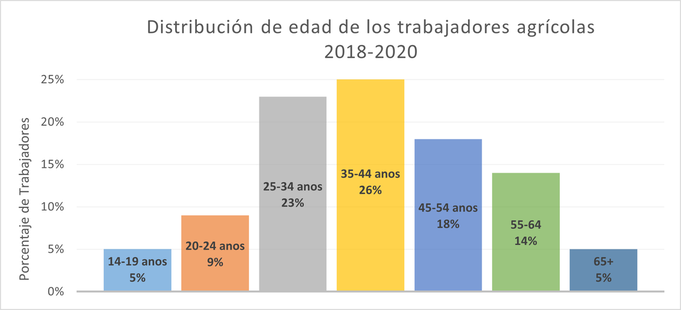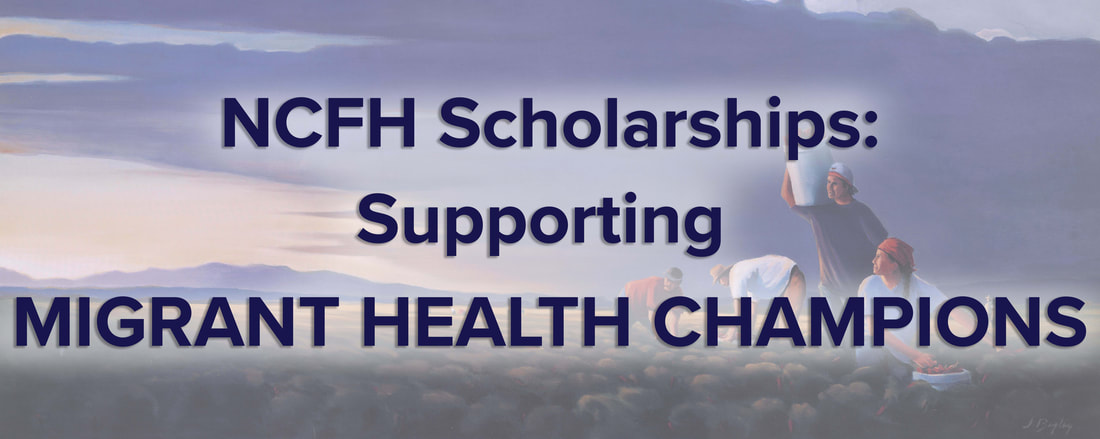This is part 2 of a 3 part series spotlighting this year’s recipients of the Bobbi Ryder Migrant Health Champion Award. These individuals are pursuing educational opportunities that further their work to ensure access to quality healthcare for Agricultural workers and their families. #AgWorkerAccess Name: Noemi Velasquez Health Center: Community Health Centers of the Central Coast – Santa Maria CA Health Center Role: Behavioral Health Outreach Coordinator Educational Goal: Pursuing a degree in Social Work Please tell us a little bit more about what you’re studying and how you are going to apply that in your work with Ag Workers? Agriculture workers are the backbone of our community; as they provide the vegetables and fruit for our sustained health. They pick the food that feeds the nation. However, they suffer from food insecurity, depression, anxiety as well as economic and social barriers. The inequities faced by Ag workers is the driving force that has pushed me to continue my education. I am currently working on obtaining my Bachelor’s degree in Social Work at Humboldt State University. While working at the Community Health Centers of the Central Coast; I encountered a tremendous need for education around behavioral health services. There is a lot of stigma around mental health. I want to work on eliminating this as it causes barriers to care. My goal is to be able to connect with individuals who need healing; to assist Ag Workers in overcoming their traumas caused by poverty. If we work closely with Ag worker parents, then the children will have more stable lives that will change the outcomes for the generations to come. As we see unrest in our country, we hope this leads to more equitable and equal benefits to health and behavioral health services. Agriculture workers cultivate the food that we all need and are essential in all our lives. Ag Workers should have equal access to health. What led you to become an Ag Worker Access Champion? Championing for the Ag Worker Access was a way to bring awareness and highlight the need for sustained health services for our Ag workers. It was important for our health center staff to collaborate on the national level to increase accessibility to health services amongst the Ag workers. Working closely to make sure that we were reaching everyone and creating equitable health care and accessibility to agriculture workers was important on all levels. For me it was personal! When families and individuals come into the health center I see them as if they were a part of my family. I see my grandparents and parents, my brother and sisters who worked picking strawberries and squash and needed preventive health services. I also see the individual that helped my father when he first stepped into the health center for assistance. The assistance he received literally saved his life. So being an Ag Worker Champion is not only a commitment of mine but an obligation to link and create accessible health services that are geared at reaching this population. Why do you care about increasing access to care for Ag workers? The commitment to farm workers grows out of the passion and need to provide adequate accessible health services to a community I honorably come from. I am dedicated in bringing awareness and light to the issues that Ag Workers face in our country. Throughout history the farm workers have been marginalized which have caused health inequity. I want to be part of the voice that brings awareness, and advocacy for agriculture workers to have access to high quality healthcare and social services that enables our communities to thrive and live healthy lives. What advice would you give to individuals interested in/considering a career in migrant health? The advice I would give someone interested in or considering a career in migrant health would be to be patient, compassionate, and understanding. Be a voice an advocate for the community that is most underrepresented and revered not important. Understand that Ag workers are essential to our sustenance and deserve to be treated with the up most respect. Working with Ag workers is a humbling and rewarding experience. The workers embrace you with humility and respect; you become part of their family. The workers think collectively as they come from communal communities in their respective territories. This work is important and going into this field means you have to be nonjudgmental, compassionate, and culturally sensitive. This enables allies, health, and mental health providers in the field to represent and speak on behalf of the most vulnerable yet important human beings in the world because without them we would not have food. How did you hear about the NCFH scholarship program? I heard about the Bobbi Ryder scholarship from my supervisor when I first started working for Community Health Centers. And later had the honor of meeting Bobbi Ryder at a Farmworker Health Conference. Bobbi Ryders commitment to farmworkers has been inspirational to a lot of individuals working in this field. I’m humbled and grateful to have been selected for this award. About the Bobbi Ryder Migrant Health Scholarship Award: Since 1984, NCFH has awarded more than $220,000 in scholarships to health center staff and board members to assist them in in pursuing their educational goals and to contribute to the development of the Community Health Center workforce. The award is named in honor NCFH’s former CEO and lifelong Migrant Health Champion, Bobbi Ryder.
These scholarship awards ae made possible through funds raised from sales of NCFH commemorative fine art prints and posters.
Comments are closed.
|
The National Center for Farmworker HealthImproving health care access for one of America's most vulnerable populations Archives
July 2024
Categories
All
|


 RSS Feed
RSS Feed